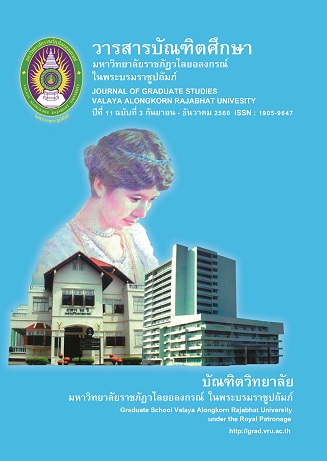การพัฒนาการจัดการเรียนรู้แบบร่วมมือ ร่วมกับแนวคิดห้องเรียนกลับด้านเพื่อส่งเสริมความสามารถในการพัฒนาหลักสูตรท้องถิ่นสำหรับนักศึกษาครู คณะศึกษาศาสตร์ มหาวิทยาลัยศิลปากร
Main Article Content
Abstract
บทคัดย่อ
การวิจัยครั้งนี้มีวัตถุประสงค์เพื่อ 1) พัฒนาการจัดการเรียนรู้แบบร่วมมือ ร่วมกับแนวคิดห้องเรียนกลับด้านเพื่อส่งเสริมความสามารถในการพัฒนาหลักสูตรท้องถิ่นสำหรับนักศึกษาครู คณะศึกษาศาสตร์ มหาวิทยาลัยศิลปากร ที่ศึกษาในรายวิชา 462 201 การพัฒนาหลักสูตร 2) เพื่อศึกษาประสิทธิผลของการจัดการเรียนรู้แบบร่วมมือร่วมกับแนวคิดห้องเรียนกลับด้าน ได้แก่ 2.1) ผลการเรียนรู้เรื่องการพัฒนาหลักสูตรท้องถิ่น 2.2) ความสามารถในการพัฒนาหลักสูตรท้องถิ่น 2.3) ความสามารถในการนำหลักสูตรไปใช้ และ 2.4) ความคิดเห็นต่อการจัดการเรียนรู้ของนักศึกษา การศึกษาวิจัยครั้งนี้ ดำเนินการโดยใช้รูปแบบการวิจัยและพัฒนา กลุ่มตัวอย่างคือ นักศึกษาระดับปริญญาตรี คณะศึกษาศาสตร์ มหาวิทยาลัยศิลปากร สาขาวิชาการศึกษาปฐมวัยและภาษาอังกฤษ จำนวน 31 คน ในภาคการศึกษาปลาย ปีการศึกษา 2558 ที่ได้มาจากการเลือกแบบเจาะจง เครื่องมือที่ใช้ได้แก่ แบบทดสอบวัดผลการเรียนรู้ จำนวน 30 ข้อ ซึ่งมีค่าความเชื่อมั่นเท่ากับ 83.40 แบบประเมินความสามารถในการพัฒนาหลักสูตรท้องถิ่น แบบประเมินความสามารถในการนำหลักสูตรท้องถิ่นไปใช้ และแบบสอบถามความคิดเห็นสำหรับนักศึกษาปริญญาตรีที่มีต่อการจัดการเรียนรู้แบบร่วมมือร่วมกับแนวคิดห้องเรียนกลับด้าน สถิติที่ใช้ในการวิจัยคือ ค่าเฉลี่ย ส่วนเบี่ยงเบนมาตรฐานและวิเคราะห์เนื้อหา
ผลการวิจัยพบว่า 1) ผลจากการพัฒนาการจัดการเรียนรู้แบบร่วมมือร่วมกับแนวคิดห้องเรียนกลับด้าน เรียกว่า “ A-TCIAPE” มีขั้นตอนดังนี้ คือ ขั้นที่ 1 Ark and Answer ขั้นที่ 2 Topic Selection ขั้นที่ 3 Cooperative Planning ขั้นที่ 4 Implementation ขั้นที่ 5 Analysis and Synthesis ขั้นที่ 6 Presentation of Final Report และ ขั้นที่ 7 Evaluation 2) ประสิทธิผลของรูปแบบการจัดการเรียนรู้แบบร่วมมือ ร่วมกับแนวคิดห้องเรียนกลับด้าน พบว่า 2.1) ผลการเรียนรู้ของนักศึกษา เรื่องการพัฒนาหลักสูตรท้องถิ่น อยู่ในระดับดี 2.2) ความสามารถของนักศึกษา ในการพัฒนาหลักสูตรท้องถิ่นทุกด้าน อยู่ในระดับดีมาก 2.3) ความสามารถของนักศึกษาในการนำหลักสูตรท้องถิ่นไปใช้อยู่ในระดับดีมาก และ 2.4) ความคิดเห็นของนักศึกษาที่มีต่อการจัดการเรียนรู้ แบบ “A-TCIAPE” มีความเหมาะสมอยู่ในระดับมาก
ABSTRACT
The objectives of this study were to 1) develop learning using Co-operative Based Learning with the concept of a flipped classroom to enhance the ability of local curriculum development for teacher students at the Faculty of Education, Silpakorn University in the 462 201 Curriculum Development Course and 2) study the effectiveness of learning using Co-operative Based Learning with the concept of a flipped classroom in terms of 2.1) learning outcomes on the local curriculum development, 2.2) ability to develop a local curriculum, 2.3) ability of curriculum implementation, and 2.4) students’ opinions towards the learning. This study was a research and development study. The samples used in this study were 31 undergraduate students in the Faculty of Education, Silpakorn University who are studying in the Department of Early Childhood Education and English in academic year 2015 selected by using a purposive random sampling. The instruments included a 30 item test on learning which has the confidence of 83.40, an assessment form to assess the ability of local curriculum development, an assessment form to assess the curriculum implementation and a questionnaire to ask students’ opinions towards the learning using Co-operative Based Learning with the concept of a flipped classroom. The statistics used in the study were mean, standard deviation, and content analysis.
The research results revealed that 1) the learning development using Co-operative Based Learning with the concept of a flipped classroom called "A-TCIAPE" had the following steps: Step 1 Ask and Answer, Step 2 Topic Selection, Step 3 Cooperative Planning, Step 4 Implementation, Step 5 Analysis and Synthesis, Step 6 Presentation of Final Report, and Step 7 Evaluation, and 2) the effectiveness of the learning using Co-operative Based Learning with the concept of a flipped classroom were 2.1) learning outcomes of students on the topic of the local curriculum development was at a high level, 2.2) the ability of the students on the local curriculum development was at the highest level in very aspects, 2.3) the ability of students to use the local curriculum was at the highest level, and 2.4) students’ opinions towards the learning based on "A-TCIAPE" was appropriate at a high level.
Article Details

This work is licensed under a Creative Commons Attribution-NonCommercial-NoDerivatives 4.0 International License.
บทความทุกเรื่องได้รับการตรวจความถูกต้องทางวิชาการโดยผู้ทรงคุณวุฒิ ทรรศนะและข้อคิดเห็นในบทความ Journal of Global of Perspectives in Humanities and Social Sciences (J-GPHSS) มิใช่เป็นทรรศนะและความคิดของผู้จัดทำจึงมิใช่ความรับผิดชอบของบัณฑิตวิทยาลัย มหาวิทยาลัยราชภัฏวไลยอลงกรณ์ ในพระบรมราชูปถัมภ์ กองบรรณาธิการไม่สงวนสิทธิ์การคัดลอก แต่ให้อ้างอิงแหล่งที่มา


